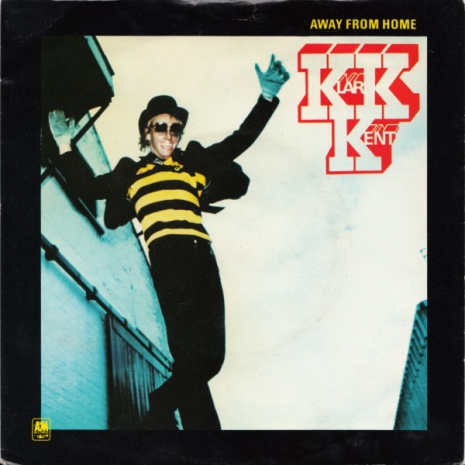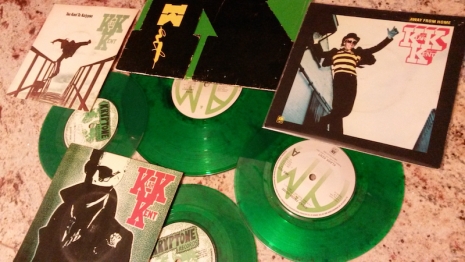
From 1978 to 1986 the Police were an undeniable musical force, with five classic albums and ten U.K. singles cracking the Top 10. It’s a curious fact, however, that the Police were beaten to the charts by one of their own. In 1978 an act going by the name of Klark Kent—Stewart Copeland would always vigorously deny having anything to do with it—released a single called “Don’t Care,” which managed to hit the U.K. charts in advance of any song by the Police. In the summer of 1980, Klark Kent released a peppy mini-album of frenetic punk-pop.
Klark Kent took its moniker seriously. The name was obviously a riff on Superman’s alter ego, and in that spirit all of the original Klark Kent releases were on Kryptonite Records, and as many releases as possible were done up on green vinyl in honor of the one substance in the universe that can bring Superman to his knees. Klark Kent used green as much as possible in its album artwork and had a knack with serifs.

In his essential book Punk Diary: The Ultimate Trainspotter’s Guide to Underground Rock, 1970-1982, George Gimarc describes the promo party for the release of the album on June 25, 1980:
Someone supposed to be Klark Kent showed up in a Darth Vader mask being towed around the room by Stewart Copeland of the Police. It’s a ruse that is transparent and well-blown, but Stewart is adamant that, “It’s not me, honest. Why do people keep saying that?”
Indeed, it was Copeland on all of the instruments—even the most cursory listen will reveal that the band sounds a whole lot like the Police circa Outlandos d’Amour.
The U.S. release of the 10-inch came in a 12-inch sleeve bearing a sticker that stated the following: “You have just purchased an I.R.S. product. Keep in mind, however, that this is no ordinary record. It has been specially sealed under clinical laboratory conditions guarded by 12 armed security officers. Upon contact with light, this 8-song album will shrink to 10 inches and turn green. Exercise extreme caution.” (Cleverly, the labels had a reduced diameter to give the visual impression of a shrunken 12-inch.)
The liner notes explaining the origin story of “Klark” find Copeland channeling Thomas Pynchon. The purported author is, ahem, “Sir Robinson Jeffries-Elder, Q.C., M.P., ex-diplomat, lecturer, bon vivant, and principal stockholder in the Klerk Kant Foundation, Limited”:
“Klerk Kant”, as appears to be his name, first came into my life as he was sitting next to me on the Concorde flight from Washington, D.C., to London. Speaking in what he claimed to be his native Sanskrit, he explained that he had been in Washington testifying before a congressional committee on church politics. His expertise in this subject had been attained while studying in a Moslem seminary in India. He underlined his religiosity (he claimed to be a “Sufi”, a kind of Islamic mystic that is rarely seen on the Indian sun-continent) by saying his noonday prayers in the aisle of the jet air-plane, jostling the stewardesses as they were trying to serve lunch, and annoying the passengers with his shouts of “Which way is Mecca? Which way is Mecca? Which way is Mecca?” while shifting his body to accommodate to the turns in the direction of the aircraft.
Later, he confessed, in sub-standard broken English, that he was “a mere computer programmer”, currently out of work but living on the sum of one million four hundred thousand dollars which he had won from I.B.M. in a successful suit against the company for stealing his “invention”. He was most secretive about the invention (“Do you want me to sue you? he asked coyly when I questioned him about it), but he adumbrated the notion that it had to do with capturing radio signals from distant galaxies, systematizing them through computer analysis, and reducing them to simple melodies which he played on the various instruments on which he is proficient.
I saw a great deal of Kent over the following weeks, sometimes in his elegant suite at the Dorchester and sometimes at my more modest digs, a bed-sit on Grosvenor Square. Sometimes he was morose to the point hostility, barely replying to my concerned questions with monosyllabic grunts. At other times, he was almost euphoric, waxing eloquent on his wide-ranging political philosophies. He would often descend to the vernacular, but his normal mode of speech was iambic pentameter in a-a-b-a rhyming pattern in which he produced perfectly worded, poetically beautiful expressions of deep moral intensity. (“I am a child ancient Syria / Suffering the pains of all this area” is an example.)
It is this peculiar combination of the profane and sacred which gives his music its unique appeal to young and old, simple and sophisticated, bovine and leontine, illiterate and intelligent, A/C, D/C, and A/C/D/C I, for one, like the underlying jazz sub-motif. My sons, being of primitive mold, see nothing in him but what they call “white collar punk”. In any case, to one and all, Klerk Kant’s music is the work of “true genius come home from a visit to the cosmos”, as the New York Times critic says. The eight songs of the disc run the gamut of KK’s extraordinary talents.
More on this mystery after the jump…





